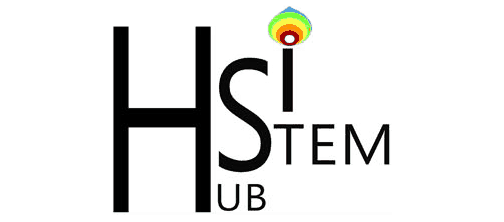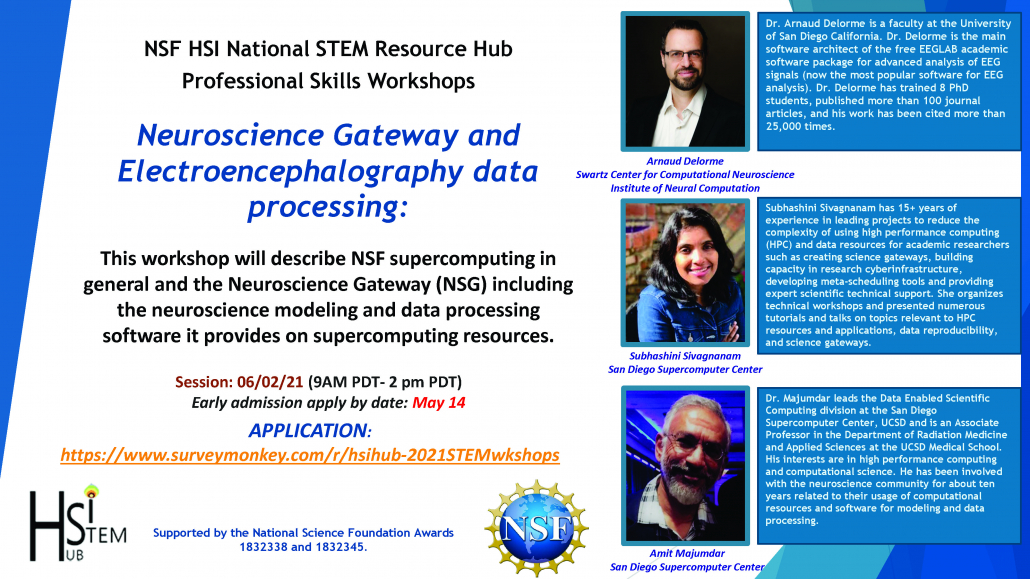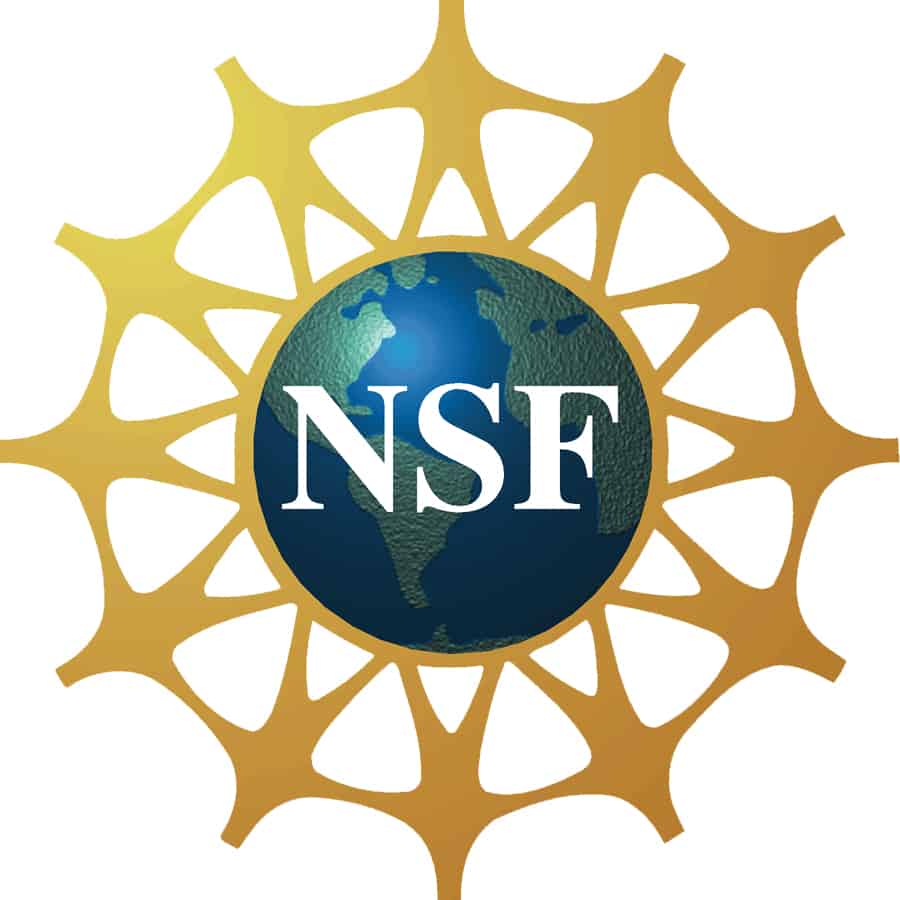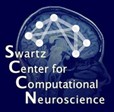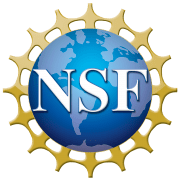Neuroscience Gateway and Electroencephalography Data Processing
Workshop Summary
This workshop will provide an introduction to large-scale computing resources available at NSF funded academic supercomputer centers for research and education. It will present the Neuroscience Gateway (NSG) a cyberinfrastructure resource that makes it easy for neuroscientists to use neuroscience software for modeling and data processing on computing resources. NSG is used for research and education by the neuroscience community. Second part of the workshop will introduce and explain the topic of electroencephalography (EEG) for neuroscientists. It will describe how EEG data is collected and analyzed using a widely used EEG data processing software called EEGLAB. It will show how to record electrical activity of the brain and various filtering done on EEG data, using EEGLAB, and how to analyze the data and relate to brain waves.
Learn about the whole summer series here: https://hsistemhub.org/2021-summer-stemed-workshops/
Goals of the Workshop
Attendees will learn about:
- Freely available NSF funded large scale computing resources available for classroom teaching and education;
- Neuroscience Gateway which specifically provides modeling and data processing neuroscience software for neuroscientists; and
- Electroencephalography (EEG) – the theory behind EEG, how EEG data can be collected and processed to tie to activities that generate EEG signals.
Tentative Schedule
At this time the schedule is tentative.
- Introduction to supercomputing and NSF funded supercomputing resources
- Introduction to the Neuroscience Gateway (NSG) and use of the NSG
- Introduction to Electroencephalography (EEG), data collection by EEG devices, and processing of EEG data to identify brain waves
Eligibility
Enrollment is free and is limited to 20 participants per workshop. It is hoped that the small workshop size will facilitate networking and promote collaboration across institutions by individuals who share common interests in research and education.
Participation priority is for current HSI faculty and staff who teach undergraduate STEM courses. Non-HSI faculty staff who teach undergraduate STEM courses are eligible to apply if they: 1) currently collaborate as PIs/co-PIs on a funded or pending NSF EHR/DUE grant that includes HSI faculty/staff as PI/co-PIs or 2) would like to network to find HSI partners for future collaborative projects in education or research.
Admission priority is for faculty within the first 10 years of their first academic tenure-track appointment. Applicants should be aware that the selection process strives for diverse geographical and institutional representation. The selection decision is final and summary reviews are not provided.
Apply
Submit your application at this link: https://www.surveymonkey.com/r/hsihub-2021STEMwkshops
Learning Objectives
- Attendees will have information about how to get time on NSF supercomputer centers, how to access the NSF supercomputers, what support there are for using these computing resources for classroom teaching, and various kinds of computing and data related training that are provided by supercomputer staff
- Attendees will be able to use the Neuroscience Gateway to run neuroscience modeling and data processing on supercomputers. NSG hides all the complexities of using supercomputers directly, and makes it easy for neuroscientists to use supercomputers for neuroscience work via NSG’s easy to use web portal.
- Attendees will have good understanding about electroencephalography (EEG). They will know how to collect EEG data using EEG devices, how to process the data on laptops, desktops or supercomputers using EEGLAB which is a Matlab based EEG data processing software and most widely used for EEG data processing. This will motivate to include EEG as a course material in their neuroscience courses.
Workshop Details
Workshop Speakers
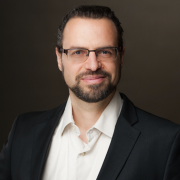
Arnaud Delorme, Project Scientist, Swartz Center for Computational Neuroscience Institute of Neural Computation.
Dr. Arnaud Delorme is a faculty at the University of San Diego California. Dr. Delorme is the main software architect of the free EEGLAB academic software package for advanced analysis of EEG signals (now the most popular software for EEG analysis). Dr. Delorme has trained 8 Ph.D. students, published more than 100 journal articles, and his work has been cited more than 25,000 times.

Subhashini Sivagnanam, Senior Computational Scientist, San Diego Supercomputer Center.
Subhashini Sivagnanam has 15+ years of experience in leading projects to reduce the complexity of using high-performance computing (HPC) and data resources for academic researchers such as creating science gateways, building capacity in research cyberinfrastructure, developing meta-scheduling tools, providing expert scientific-technical support, and leading training effort. She organizes technical workshops and presented numerous tutorials and talks on topics relevant to HPC resources and applications, data reproducibility, and science gateways.
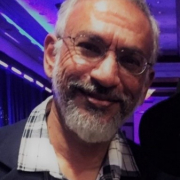
Amit Majumdar, Division Director, Data Enabled Scientific Computing division, SDSC; Associate Professor, Department of Radiation Medicine and Applied Sciences, San Diego Supercomputer Center.
Amit Majumdar leads the Data Enabled Scientific Computing division at the San Diego Supercomputer Center (SDSC), UCSD, and is an Associate Professor in the Department of Radiation Medicine and Applied Sciences at the UCSD Medical School. His interests are in high-performance computing and computational science. He has been involved with the neuroscience community for about ten years related to their usage of computational resources and software for modeling and data processing.
Workshop Sponsors and External Links
- Acknowledging grants: NIH R24MH120037, NIH R01EB023297, NIH R01NS047293, NSF DBI1935749, NIH U24EB029005
